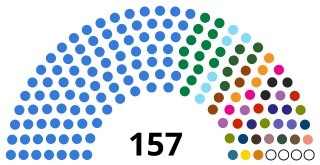 W
WThe current Constitution of Mauritania was adopted on 12 July 1991. There have been several constitutions since Mauritania's independence in 1960.
 W
WThe High Council of State was the supreme political body of Mauritania. It served as the country's interim government following the coup d'état which ousted the President, Sidi Ould Cheikh Abdallahi on August 6, 2008. It was led by General Mohamed Ould Abdel Aziz. After seizing power it quickly pledged to hold elections "in the shortest possible period". A few days after seizing power, Abdel Aziz named Mauritanian Ambassador to Belgium and the European Union, Moulaye Ould Mohamed Laghdaf, as Prime Minister.
 W
WHuman rights in Mauritania is generally seen as poor according to international observers, including Freedom House, the United States Department of State, and Amnesty International.
 W
WThe Gendarmerie Nationale is the national police force of Mauritania. The gendarmerie is part of the army and maintains posts in the urban and rural parts of the country.
 W
WThis is a list of prime ministers of Mauritania since the formation of the post of Prime Minister of Mauritania in 1960 to the present day.
 W
WThe Mauritanian Parliament (Barlamane/Parlement) is composed of a single chamber, the National Assembly. Composed of 157 members, representatives are elected for a five-year term in single-seat constituencies.
 W
WThe Military Committee for National Recovery was a short-lived military government of Mauritania after the coup d'état that removed long-time President Moktar Ould Daddah on July 10, 1978, until a second coup on April 6, 1979. It was headed by Colonel Mustafa Ould Salek. It was followed by a second junta, the Military Committee for National Salvation (CSMN).
 W
WThe Military Committee for National Salvation was a military government of Mauritania that took power in the 1979 coup d'état. It was installed by Mohamed Khouna Ould Haidalla, Ahmed Ould Bouceif and fellow officers, in an internal regime/military coup on April 6, 1979, removing Colonel Mustafa Ould Salek of the Military Committee for National Recovery (CRMN) from effective power. He was replaced by Mohamed Mahmoud Ould Louly in June 1979; Haidalla would later emerge as the main military strongman, and go on to assume full powers in the 1980 coup d'état, only to be deposed by Maaouya Ould Sid'Ahmed Taya in the 1984 coup d'état. The CMSN remained as an institution until 1992, when Taya introduced a multi-party system following the 1991 constitutional referendum – he himself lost power only in the 2005 coup d'état.
 W
WThe Military Council for Justice and Democracy was the supreme political body of Mauritania. It served as the country's interim government following the coup d'état which ousted the President, Maaouya Ould Sid'Ahmed Taya on 3 August 2005. It was led by the former director of the national police force, Colonel Ely Ould Mohamed Vall. After seizing power it quickly pledged to hold elections within two years, and promised that none of its own members would run. A few days after seizing power, Vall named Sidi Mohamed Ould Boubacar as Prime Minister following the resignation of Taya's last Prime Minister, Sghair Ould M'Bareck.
 W
WThe Ministry of Foreign Affairs is the national ministry of foreign affairs of Mauritania. It has its headquarters in Nouakchott, just to the northwest of the Nouakchott Convention Center complex.
 W
WThe Ministry of the Interior and Decentralization is the national Ministry of the Interior of Mauritania. Its headquarters are located in Nouakchott, just south of the Presidential Palace, between the Chamber of Commerce and the College of Science and Technology.
 W
WThe National Assembly is the legislative house of Parliament of Mauritania. The legislature has 157 members, elected for five-year terms in single or two-seats constituencies. From 1961 until 1978, the only legal party in the country was the Mauritanian People's Party. The legislature was disbanded after the 10 July 1978 coup. In 1992, a bicameral legislature was established, consisting the National Assembly and Senate of Mauritania. In the 1990s, a multiparty system was introduced in Mauritania. However, the Democratic and Social Republican Party dominated the parliament until a coup in 2005. The first truly democratic elections were held in 2006.
 W
WThe Sennate was the upper house of Parliament in Mauritania from 1992 to 2017. The Senate had 56 members, 53 members elected for a six-year term by municipal councillors with one third renewed every two years and 3 members elected by Mauritanians abroad.